September 1975
Wings 1975 tour book
Press interview • Interview of Wings
Last updated on September 3, 2023
September 1975
Press interview • Interview of Wings
Last updated on September 3, 2023
Session September - October 1975 • "At The Speed Of Sound" sessions #1
Interview September 1975 • Paul McCartney: Growing Up, Up and Away From the Beatles
Interview September 1975 • Wings 1975 tour book
Concert Sep 09, 1975 • United Kingdom • Southampton
Concert Sep 10, 1975 • United Kingdom • Bristol
Next interview Sep 13, 1975 • Paul McCartney interview for Record Mirror
Officially appears on Venus and Mars
Jun 16, 1979 • From Melody Maker
‘Mary Had A Little Lamb’ … those lyrics are a heavy trip
Dec 02, 1972 • From Melody Maker
Dec 02, 1972 • From Record Mirror
May / June 1972 ? • From McCartney Productions
Feb 16, 1972 • From Radio Leeds
Feb 12, 1972 • From Disc and Music Echo
Jan 13, 1972 • From WRKO
Dec 15, 1971 • From WCBS-FM
Dec 04, 1971 • From Record Mirror
‘Aggressive simplicity’ is how Mike Hennessey describes the new LP by Paul McCartney’s group.
Nov 20, 1971 • From Record Mirror
This interview remains the property of the respective copyright owner, and no implication of ownership by us is intended or should be inferred. Any copyright owner who wants something removed should contact us and we will do so immediately.
There is Paul McCartney, spoon poised over a seafood cocktail, outside the window the cobbled streets of Rye the Spring sunlight glinting on the silver cutlery, bringing out the highlights on the glasses of hack and claret, and there is me asking him about the imagery on his new LP. “Venus & Mars”.
“They…..“ I start
“Who?” he asks
“Venus & Mars,” I say, “appear on the opening track on both sides. On side one they seem to be sitting in a sports stadium, on side two in a cathedral. In both cases, the music sounds like baroque church music”
“Does it?” says Paul.
“Well yes it does,” I tell him, “and I couldn’t help wondering if you had the Botticelli picture in mind.”
“What picture?” he asks, his eyes wide with sardonic candour.
“The one of Venus & Mars”
“I’ve never seen it.”
“But you know they were lovers? “
“Who were ?”
“Venus & Mars, the Gods”.
“I didn’t know that. Anyway in the song it’s the planets. They’re in a favourable aspect you know. I just chose two at random and they turn out to be the nearest to Earth. I didn’t know that either.”
Collapse of intellectual theory. Some passing children look in at the window of the Mermaid Hotel. They giggle. “That’s Linda,” says one. “Go away or I’ll wee on you,” said Paul, but not so loud as they could hear. This wasn’t a gratuitous remark, however. I’d just told him how, when my stepdaughter was three, she’d had an attack of true Beatlemania and I’d once overheard her having an imaginary conversation with him and threatening such a course if he didn’t behave himself.
Linda and he were amazed by such a tale, yet it must be odd to have been at one time the object of such worldwide hysteria and now to be able to eat in a dining room visible from the street and to walk, remarked, but unmolested through an English town in May.
Paul, unasked this time, returns to the new album. He says that he wrote the Cathedral verse first, the sports stadium Verse afterwards, so perhaps the music is a bit churchy. I ask him how he writes songs for an album. Has he a theme in mind?
“No”, he says, “but people always try and find one. Of course, when the songs are written around the same time, there may be some link, unconscious perhaps”?
All he does is “reach for them out of the air“.
Did recording in New Orleans affect it all?
“Not really, there’s the little spoken bit, ‘It’s very good to be back in New Orleans. Yeah, heh, heh, yeah, yeah,’” but they’d written the songs in many countries of the world whilst they were travelling away from England. The mixing hadn’t been done in New Orleans because they’d moved Wally Heider’s in L.A. to add the strings there. New Orleans was great for brass but L.A. was better for strings. The conversation became general. Joe English, Wings’ new drummer, was there, and Denny Laine was both piratical and funny and in love with boats and the sea. Jimmy McCulloch, intense and Scottish, everyone friendly, wine flowing. Paul getting worked up about how we should vote against the Common Market, not because of economics, but because it would destroy the uniqueness of England with its miles and inches, instead of kilometres and centimetres. All we needed, he said, was to get up tomorrow and start working, everybody, together and we’d soon be out of the mess. He spoke eloquently, passionately, but I thought, all very well for us chum. We do what we want, and you can even afford it. It’s different and boring in a factory or an office. I tried this out on him, but he proposed more entertainment, more leisure. They brought us soles and veal.
How strange is the life of the popocracy. World roaming. their cities like other peoples’ suburbs; their sacred spots, the huge sports stadiums, the famous recording studios. Paul and Linda with their three children, very close and warm together, writing and playing music; an air of purposeful whim in their peregrinations, and the end product, albums of elaborately recorded music, no expense spared and through the brass, the strings, double tracking, mixing, dubbing, the talent to project something both simple and complex about their time.
They’d sent me the tape and asked me, if I liked it, to write this piece. I thought I would like it, because ‘Band on the Run’ was my favourite L.P. for ages, so I played it once and said yes, and we arranged to have lunch in a Covent Garden restaurant when I came back off tour. Then they rang to say they’d be in Rye (which the painter, Edward Burra, calls Tinkerbell Town’), because Paul and Linda have a house nearby (like foxes, pop stars have many earths to go to), and they were rehearsing ‘wings’ in an old cinema they’d hired and wired for sound. So, they sent a huge silver grey Rolls with a cocktail bar with silver topped decanters, and Brian Brolly, the McCartneys manager sat in one of the jump seats and played us the tapes again on a stereo cassette and as opposed to just liking the new album I began to get to know it properly and with mounting enthusiasm.
Through South London, self-conscious in such a great car with prices in the shops and on the stalls rising almost visibly, but then the comfort… both actual and symbolic. The limo is the popocracies’ way of saying, ‘We’ve made it’. In L.A., in New York, everywhere they wait for their bejeaned cargoes purring through the cities and along the freeways; even the skies looking expensive through their tinted windscreens. And so we came to Rye and lunch.
The L.P. I decided would yield to no analysis in particular terms.
Paul’s resistance, whilst polite, was absolute. I approached it obliquely. The second song anyway, is simple. It’s called ‘Rock Show’ and swings like the clappers. The ‘Rock Show’ (or shows, for there are three), are evoked with infectious excitement. ‘They’ve got Longhair at the Madison Square’, sings Paul. I decide to risk it.
“It is that the audience has longhair or does it refer to Professor Longhair, the New Orleans pianist?”
“Yeah, it’s him,” says Paul. “He’s great, a real dandy and still fancies his chances with the girls, or maybe he just likes to make certain you know that he used to be a ladies” man. The way he sits and that…”
So New Orleans, birthplace of jazz, had seeped into the record, and later I learnt that they’d hired a marching band to play on the quay when Paul held, first a press conference. and then a party on a river boat, and they’d dressed as clowns for Mardi Gras. It’s just that he’d never got round to going to Preservation Hall or Antoines.
The rest of the album visits the various comers of McCartney’s mind. Love songs, almost naively simple but always just a hairsbreadth this side of sentimentality: an irresistible piece of thirties pastiche called ‘You gave the answer’; science fiction, more comic strip-like than apocalyptic; a heavy rocker by Jimmy McCulloch; ‘Listen to what the man said’; perhaps a little touched by Mardi Gras, a Black feel to it for sure; ‘Treat her gently’, a song about the old, almost like a serious version of ‘When I’m sixty-four’; a strange surrealist song in which joke imagery is counter-pointed by ‘Spirits of Ancient Egypt’, ‘Shadows of Ancient Rome’, and ‘Echoes of Sunken Spain’. Paul can touch poetry when he isn’t trying. Words that stand up as words without the help of music. The whole LP is a mixture of the tough (but never nasty) and the tender. There may be no ‘plot’ or ‘theme’, but it jells, welds, becomes a true show and not simply a string of songs. Really what it’s most like is a well-balanced music-hall bill.
Lunch over and the McCartneys and Wings go to rehearse in the shabby thirties kitsch of the super-annuated cinema. They rehearse because they are thinking of going back on the road. Paul could simply make records, but he likes to perform and yet there is hesitation; a family life is somehow difficult to equate with all that screaming, the raving, funky, groupie-haunted ambience of a Rock Show’s progress.
Paul’s done all that, but the problem is can you work up an audience, help them get their rocks off, when you are now a loving couple with three kids in tow? He wants to try though. He is a performer, always will be.
They’re rocking well in the cinema. We sit in the dark stalls and listen. Linda is at the electric keyboards playing simply but well and singing forcefully enough. Whatever they say, and how they say it, she’s no passenger. It’s strange how the McCartneys arouse the musical press to malice. The LP’s very formidable, and as a live band, Wings sounds very good indeed. Is it their happiness that provokes the sneers and innuendos, the sub-Tom Wolfe put-downs? They come, the press, drink the drinks, gobble up the food and go back to their offices to hammer out their mindless anger. Do they want more victims? Can’t they envisage rock based on optimism rather than despair? Must all musicians prove themselves at risk?
They’re unrepentant though, the McCartneys. ‘Venus and Mars’ is packaged in carnival style. Across the photographs two or more billiard balls bounce through the landscape, hiding behind rocks, floating in the air like Magritte’s apples.
Wings ‘Venus and Mars are alright tonight’, and so are Linda and Paul McCartney.
George Melly
Paul McCartney
“I’m not into being remembered,” Paul McCartney claimed in between rehearsing “Magneto and Titanium Man” and “Lady Madonna”. “It’s getting it right now that I’m interested in“.
Getting it over the past twelve months has involved winning a Grammy for the best group performance of the year (Band on the Run), recording a single in Nashville that extended America’s longest string of consecutive top ten hits to seven (Junior’s Farm), travelling to New Orleans to record an album with prerelease orders of one and a half million, (Venus and Mars) and assembling an incarnation of Wings with which he feels he can tour the world.
“The Sgt. Pepper time was the happiest period of my life for a long while“, McCartney explained while Denny Laine sang country songs in the derelict Ealing Cinema turned rehearsal hall. “But it happens again now. New Orleans was the most recent high point. I think we made a good record“.
His confidence in his musicians is reflected in his willingness to drop his top billing and let the group stand on its own as Wings. “Paul McCartney and Wings is an embarrassment to me,” he admitted. “It was never Paul McCartney and the Beatles, Paul McCartney and the Quarrymen, or Paul McCartney and the Moondogs. Wings is quicker and easier to say and everybody knows I’m in the group anyway“. Indeed they do. The Beatles had scored more number-one singles in both America and Britain than any act before or since. When they broke up their every move was analyzed by a worried world. All were able to continue surprisingly separate careers and when Charlie Gillett recently tabulated every BBC top twenty entry in history he found that the man who had written more of them than anyone else was Paul McCartney.
McCartney was born in Liverpool on June 18th, 1942 and it was there that his father cultivated his interest in music. “I’m pleased my dad is proud,” Paul smiled, “He has a lot to do with my being musical. He was always playing piano when I was a kid, and he taught me harmony. We would listen to the radio and he would ask me if I could hear the bass line, ‘the low one’“.
Brother Mike changed his professional name to Mike McGear to avoid sibling rivalry and pursued his career in comedy. The two lads came together again in 1974 when, at the suggestion of George Harrison, Paul produced Mike’s solo album at 10 c.c.’s Strawberry Studios. “We drove from Stockport to Liverpool every day, two hours both way,” sighed Paul.
Although the Cavern Club, where the Beatles won the attention of the pop business, has been sacrificed for Liverpool’s new underground train service, Paul returns there frequently to see his family. He also is pleased to be on good terms with his boyhood friends, the former Beatles. “It’s all cool now that the legal mess has been fixed,” Paul said happily.
McCartney returned to rehearse with Wings selections from that repertoire of composing credits. His historic sales statistics seemed almost meaningless as numbers from every phase of his career blended into each other: “Band on the Run”, the title of 1974’s best-selling album in the world; “Maybe I’m Amazed”, his first solo; “Live and Let Die”, his James Bond Film theme; “My Love”, Wings’ first American success number one, and “Hey Jude”, the Beatles biggest hit. It is songs such as these Wings will play when they bring their “Rock Show” to your town.
Linda McCartney
“I’m part of the frosting for this band,” Linda McCartney explained. “The four lads are the nucleus of the band“.
Born in 1942 in New York, Linda plays keyboards such as the Minimoog, organ piano and clavinet and provides the female harmony on such tracks as “Live and Let Die” and “Jet”. Linda also services as the unofficial group photographer, a task for which she was well-prepared. Trained at the Arts Centre of Tucson, Arizona, she came back to New York. “I moved for stupid reasons“, she admitted. “I read in the Sunday New York Times there were a few art openings coming up and I thought I should see what was happening“. All turned out for the best regardless. She got a job with Town and Country magazine and became staff photographer at the Fillmore East.
In England on assignment in 1967 she met Paul McCartney at a club and, after a period of seeing each other in New York and London they married on March 12th 1969 at Marylebone Registry Office. A book of her photos, “Linda’s Pictures”, will be published by Random House this fall. “My favourites are my pictures of Jimi Hendrix,” she explained. “We became friends on a human level“. Her candid snapshots of Paul have appeared on the covers of “McCartney”, “Ram” and in the “Band on the Run” poster. Others will appear in “Linda’s Pictures”.
The song “Linda”, popularized by first Buddy Clark and later Jan and Dean, was written when Linda’s father Lee suggested a client songwriter write a song about his daughter in lieu of payment.
Denny Laine
“Wings is a challenge for me more than anything“, Denny Laine said, answering the inevitable question as to why he has stayed with the McCartneys through so many incarnations of the group. “People tend to forget, but it’s the same for me: the challenge to get back up there after the Moodies“.
Laine, born in Birmingham on 29th October, 1944, had served as lead singer and guitarist for the Moody Blues after disbanding Denny and the Diplomats. An old American blues number “Go Now” took Laine to number one in Britain and the top ten in America. After writing the follow-up “Stop”, and most of the numbers on “The Magnificent Moodies”, Denny and the group went into a tailspin and he left before they re-emerged in 1968. He spent brief periods in GB’s Airforce, Balls and the Electric String Band.
Denny also paid attention to his writing, composing Colin Blundstone’s top ten hit “Say You Don’t Mind”. In 1971 he joined McCartney, an acquaintance from days when Paul visited the Moody Blues’ house in Roehampton. One of their joint compositions “No Words” appears on “Band on the Run”.
“A lot of my friends ask me why I don’t do more of my songs these days,” Laine revealed. “I’ve just brought a house around the corner from the McCartneys, so we’ll be writing more together.”
He has been living on a houseboat, but now Laine, who with his girlfriend Jo and their children Laine, two and Heidi, nine months, claims that “I’d like to be a quiet, family man“.
Denny’s first appearance with the McCartneys was on Wings “Wild Life”. He has since played on Wings’ hit singles, “Hi Hi Hi/C Moon”, “Live and Let Die”, “My Love”, “Helen Wheels”, “Jet”, “Band on the Run”, “Junior’s Farm”, and “Listen to What the Man Said”.
In occasional leisure moments, he has captained a tugboat across the Channel.
Jimmy McCulloch
“I’d never take any hour back,” Jimmy McCulloch reminisced about his career in popular music. The sentiment is frequently heard, but rarely from a man of twenty-one.
McCulloch has a lot to look back on. At thirteen he joined the Glaswegian group One In A Million. “My folks helped us get a truck and backed us all the way,” Jimmy said proudly.
Moving to London, the Scots teenager joined Thunderclap Newman, played on the number one single ‘Something in the Air‘, and composed the title track of ‘Hollywood Dream’, He then toured with John Mayall and joined Stone the Crows.
It wasn’t all glamour being a child rocker. “I had to rely on cabs and public transport“, Jimmy recalled. “I went for a Jethro Tull audition on the tube once. It was the Piccadilly Line from Wood Green to Leicester Square, and I had to stand with my guitar upright in a packed tube. Then it turned out I was too young for the audition”. After leaving Stone the Crows and serving a brief stint with Blue, McCulloch auditioned with McCartney. This time he passed the audition. His first Wings solo was the “Take Me Down, Jimmy!” bridge on ‘Junior Farm’, and his ‘Medicine Jar’, co-written with Colin Allen of Focus appears on ‘Venus and Mars’.
The only romantically unattached member of the group, McCulloch has taken up weekend golf for relaxation. He often returns to Scotland to see his mates and supports Scotland in international matches, even when he thinks they might lose.
Joe English
“Two years ago, everything was working against me,” Joe English marvelled. “My old lady and two kids left me. I had no gigs, no money. I was on the bottom. But Dayle stuck with me, kept my spirits up, and helped me get through the year.“
Joe English’s predicament after Jam Factory broke up is one with which Paul McCartney and Denny Laine can sympathize. The Rochester, New York native had joined the band in 1968, when he was 18 and stayed with them for six years, touring with Jimi Hendrix and the Grateful Dead, playing at the Fillmores East and West, and releasing an album on Epic.
While touring with the Jam Factory, English became fond of the Atlanta, Georgia area and moved to the Macon complex of the Allman Brothers Band with girlfriend Dayle. His lot is far happier now than it was in early 1974: “We have three dogs, twenty-five chickens, a goat, six horses, and a cat, Amos, who we brought back from near death after he’d been thrown out of a car. I like to run a Massey Ferguson 150 tractor, fish, and plough on the farm. It gets me away from the business.“
English was rehearsing with Bonnie Bramlett in early 1975 when he got a phone call from Paul McCartney. Tony Dorsey, one of the arrangers of Wings New Orleans sessions, had recommended Joe to Paul, and Joe accepted Paul’s summons to Louisiana. The next day they were recording, and when riding to a mixing session in Los Angeles, “Paul turned to me in the car and asked if I’d like to join. I said yes, and that was it. Who wasn’t a Beatle fan? You flash back to those first days, and it’s fun! What shocks me is to realize how many tunes he’s written.“
The American English, who replaced the English Geoff Britton, plans to rent a place in England this summer to use as his new music business base.
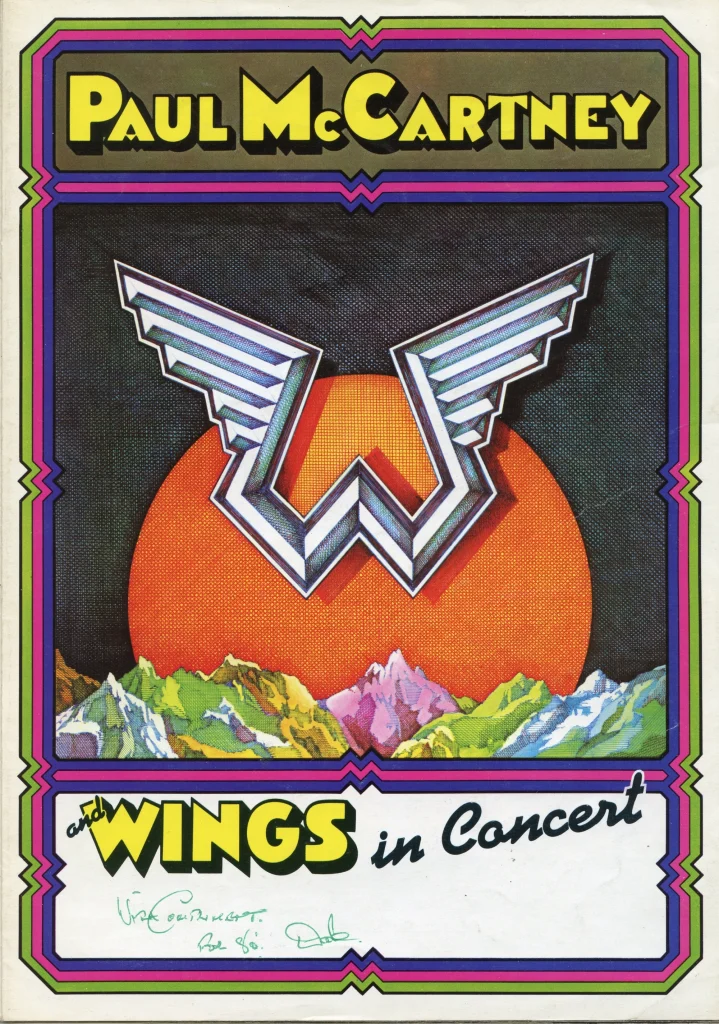
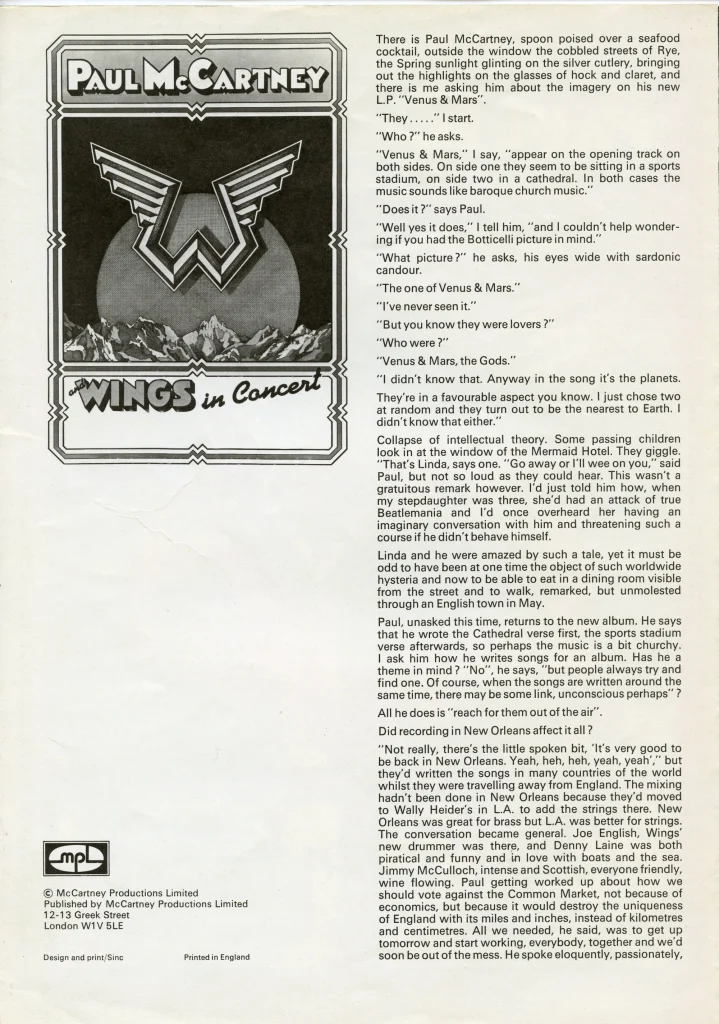
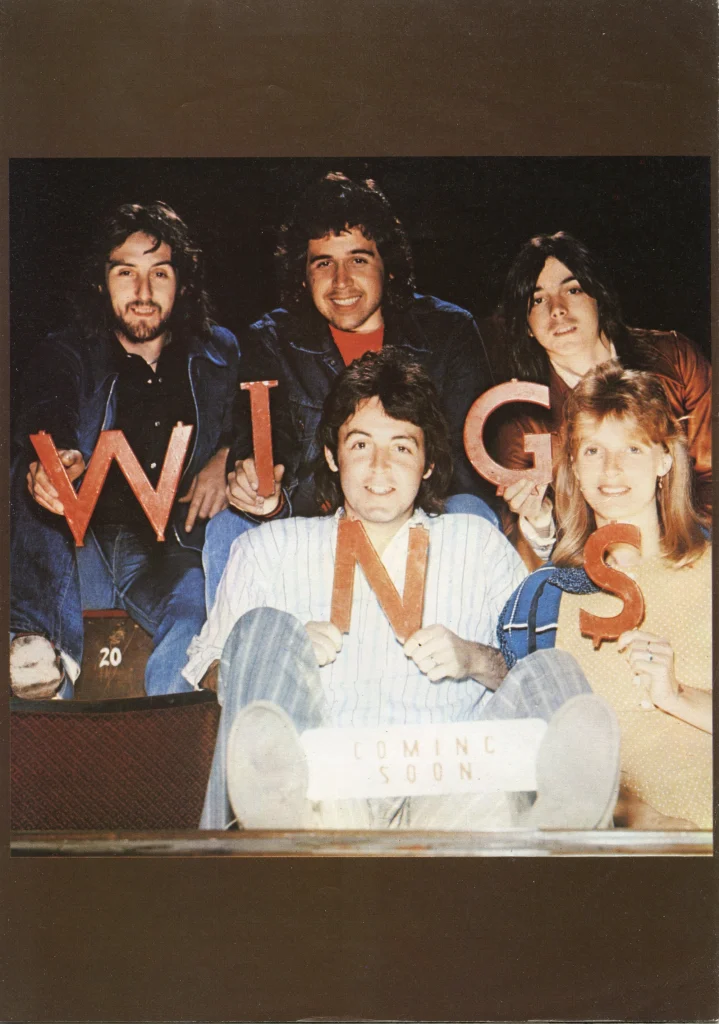
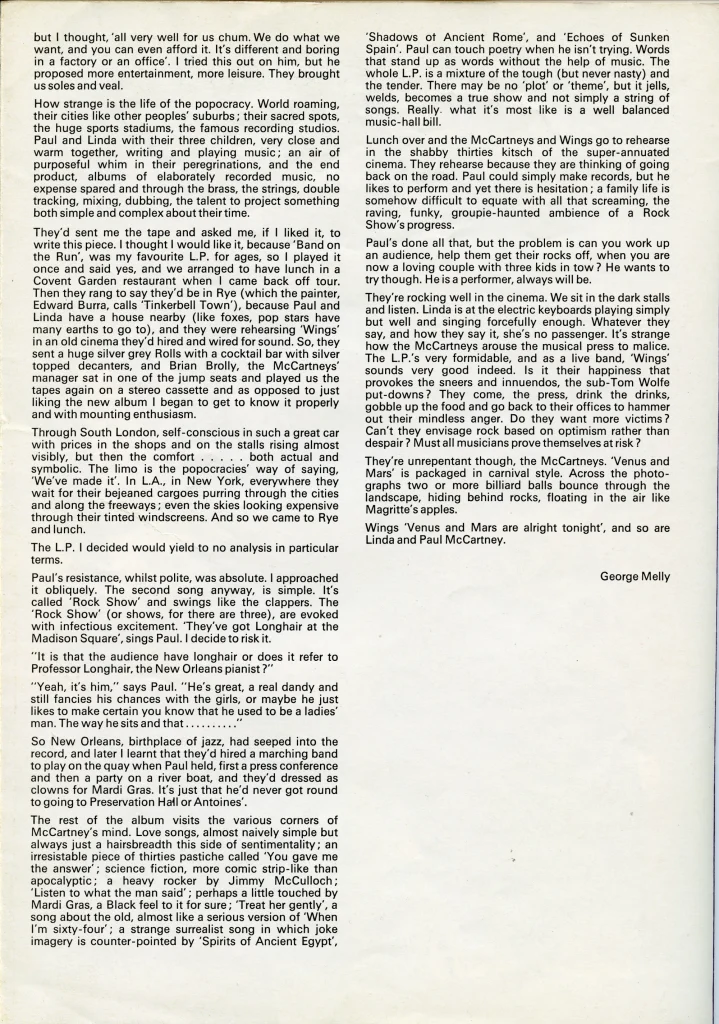
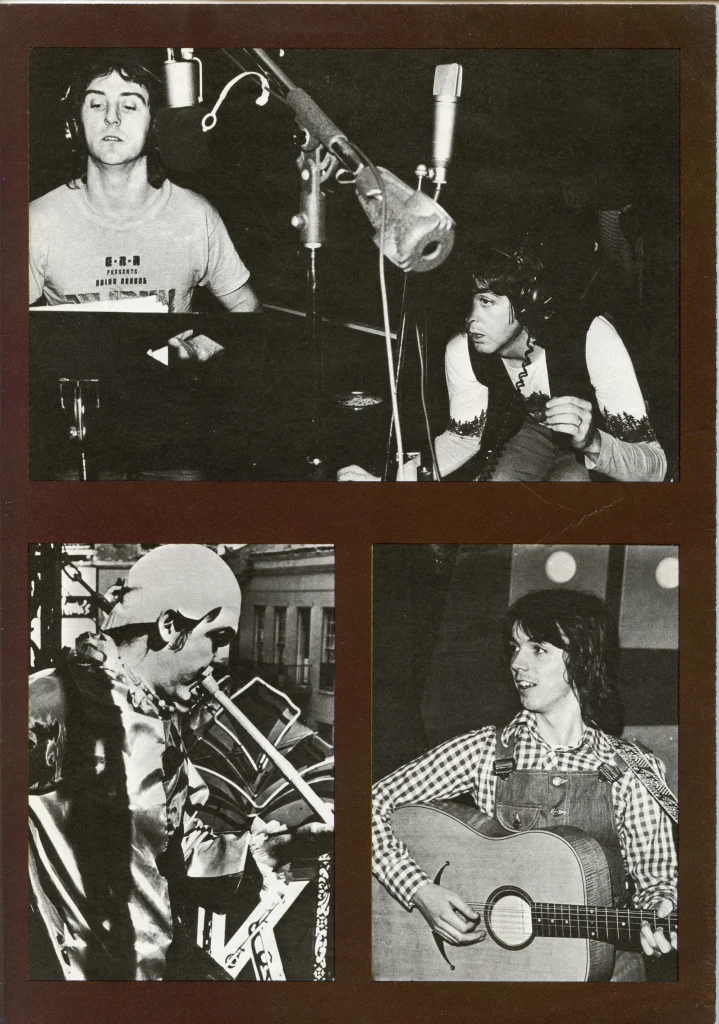
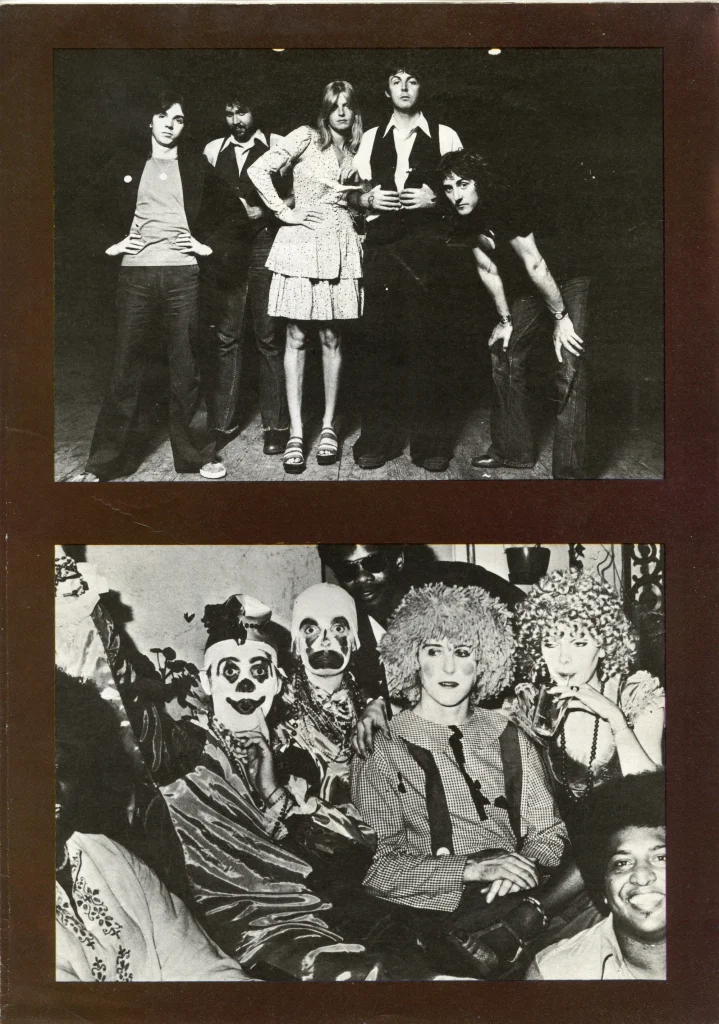
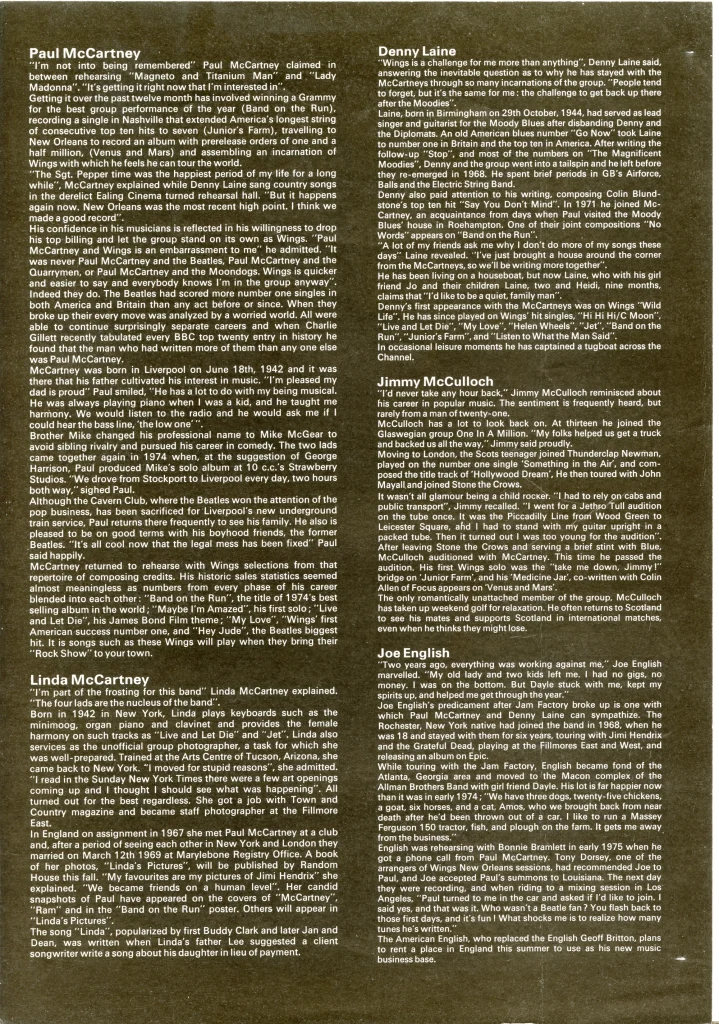
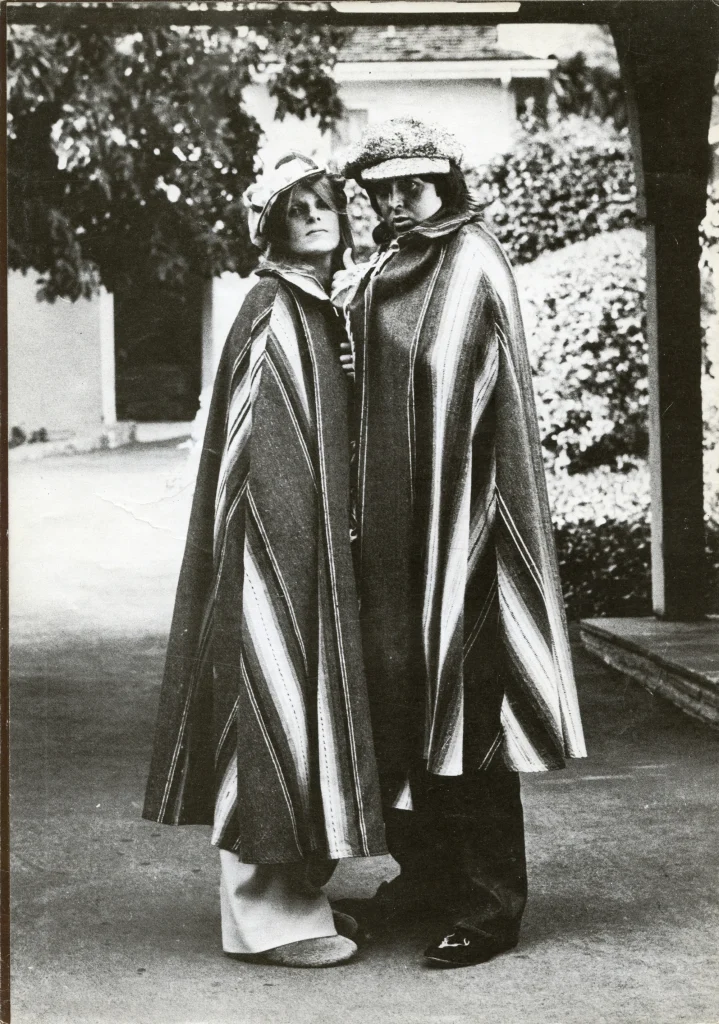
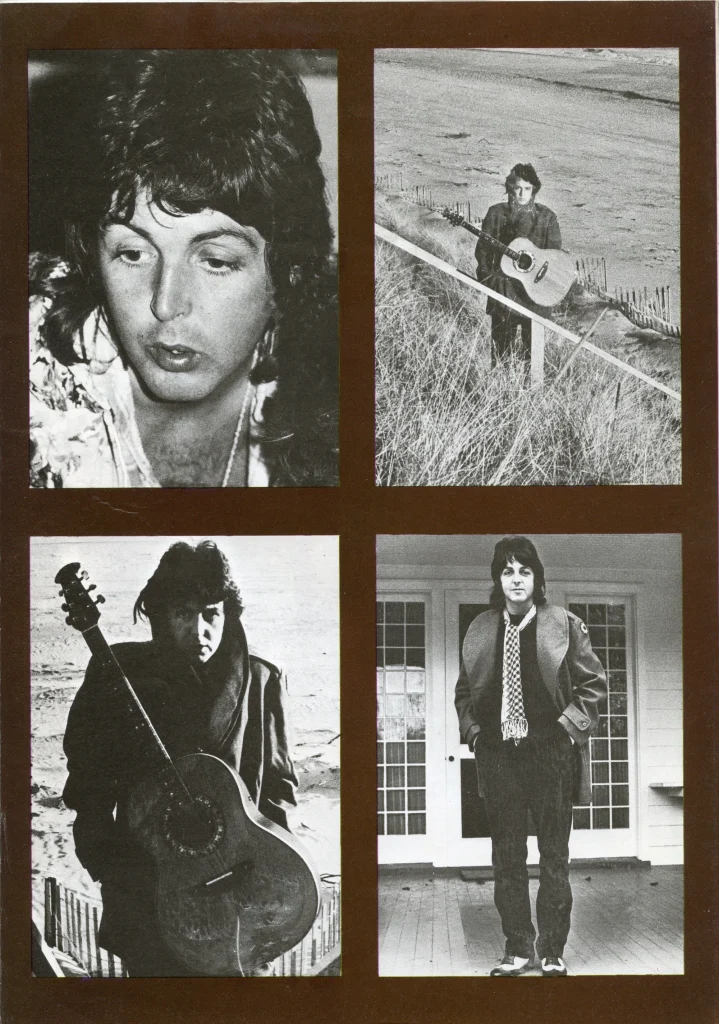
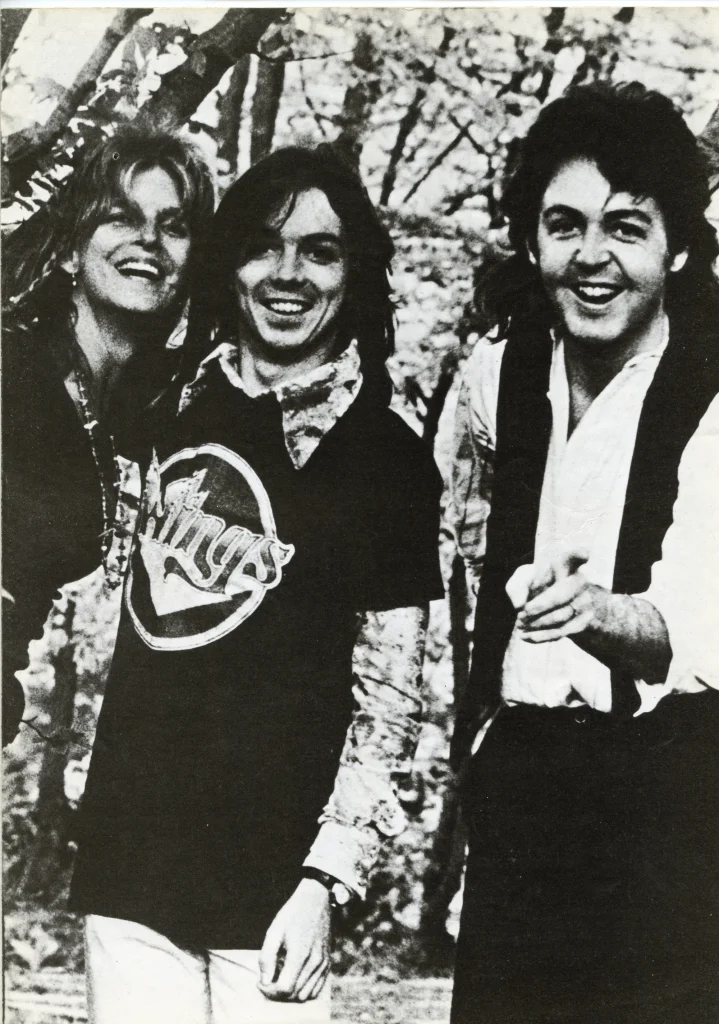
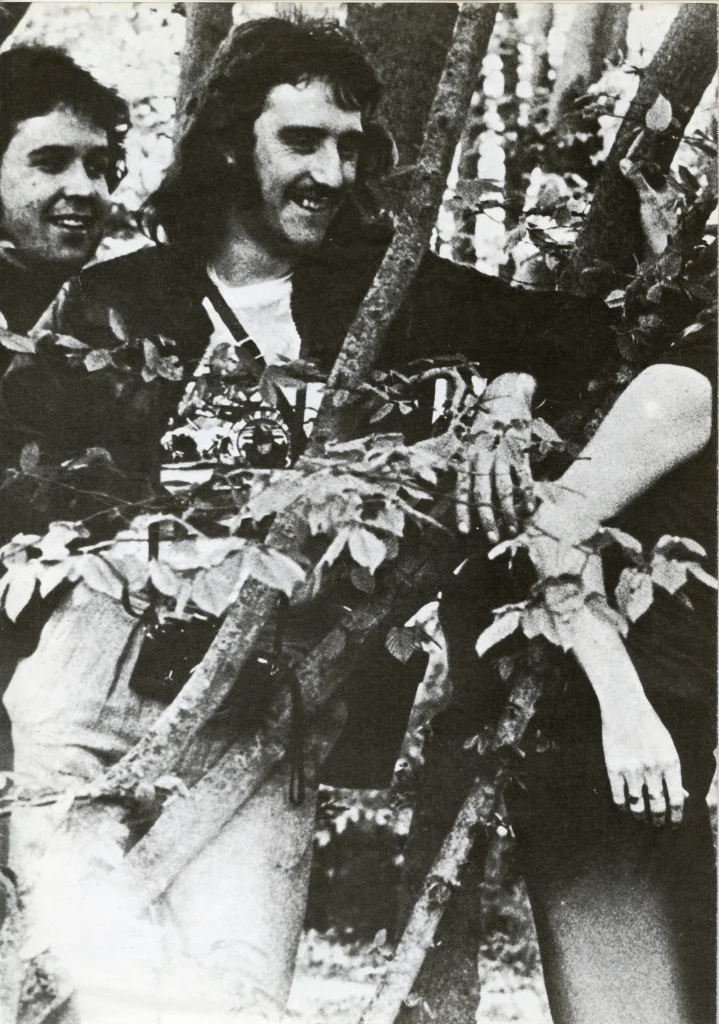
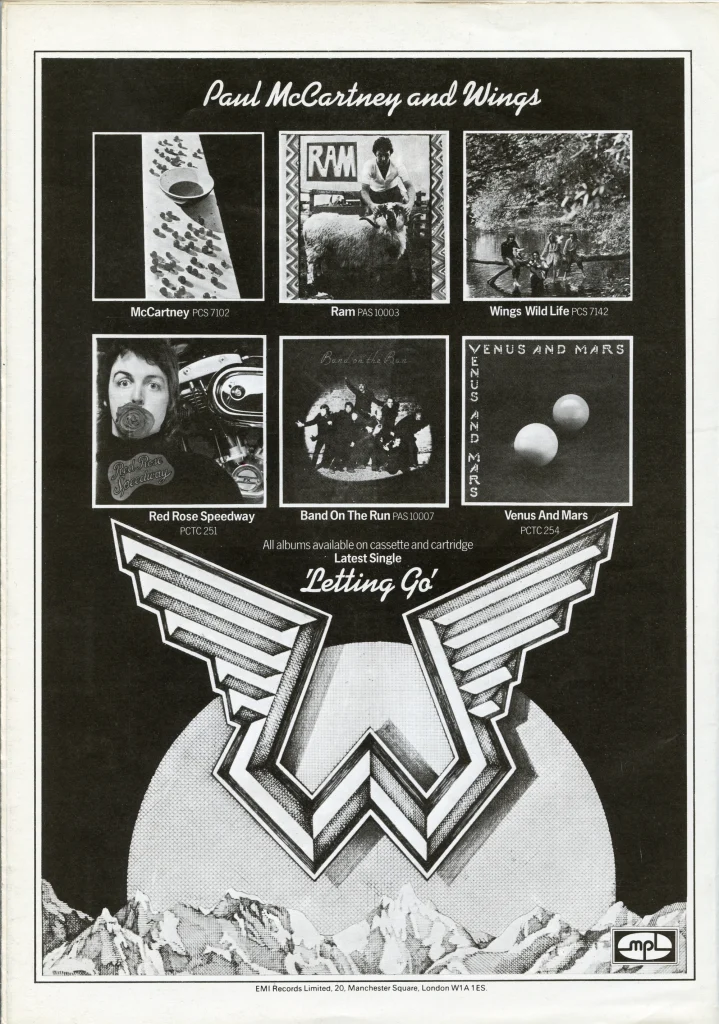

Notice any inaccuracies on this page? Have additional insights or ideas for new content? Or just want to share your thoughts? We value your feedback! Please use the form below to get in touch with us.